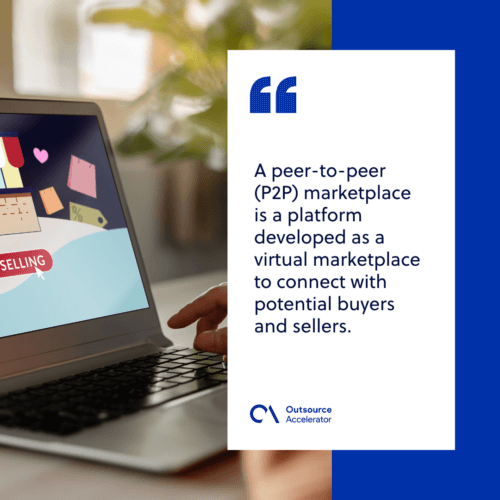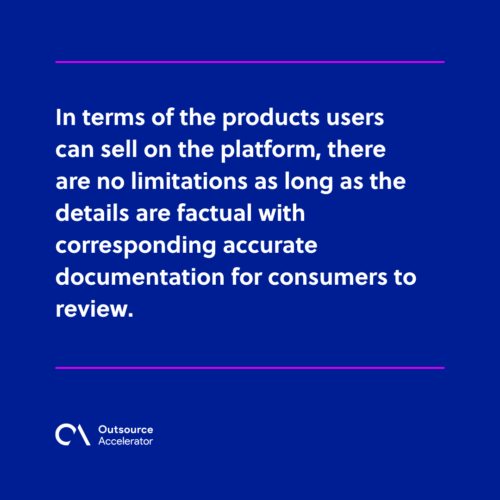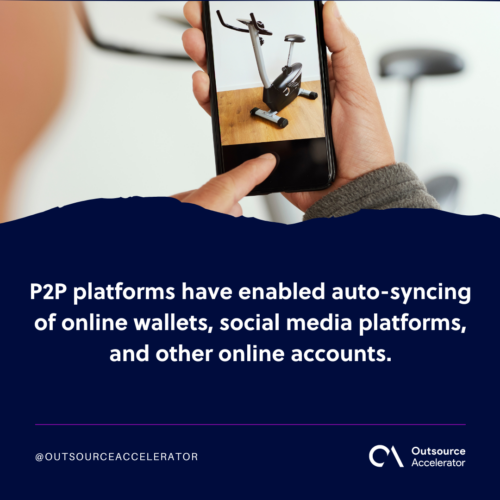How to build your own business success through a peer-to-peer (P2P) marketplace

Advancements in communication and software development have dramatically changed business transactions. Purchasing goods without the hassle of shipping is becoming increasingly popular among consumers.
In fact, at the height of COVID-19 lockdowns, these online marketplaces have been the go-to platform globally for everyday business and personal needs.
From buying groceries to selecting gifts for events, even choosing house accessories – all of these were coursed through these peer-to-peer marketplaces.
With everything going back to the way it was pre-COVID, the popularity of these peer-to-peer marketplaces continues to soar.
This article introduces P2P marketplaces, how they work, and how to successfully use them to everyone’s advantage.
What is a P2P marketplace?
A peer-to-peer (P2P) marketplace is a business model developed as a virtual marketplace to connect with potential buyers and sellers.
As there are a lot of users in the P2P marketplace, buyers have a lot of options to choose from, which seller they think best fits their needs.

Marketplace owners or sellers, on the other hand, have more opportunities to penetrate different markets to promote their products and services.
The good thing about peer-to-peer marketplaces is that the roles of the buyer and seller interchange.
Sellers can also buy from other sellers, while buyers can be sellers themselves. Some of the most popular P2P marketplaces are Uber, which offers on-demand taxi services, and Airbnb for home and vacation rentals.
Some common types of peer-to-peer marketplaces include:
- Sharing economy – It involves people selling services or rental marketplaces.
- Crowdfunding – This type of P2P marketing includes having financial support from backers and supporters.
- Consumer-to-consumer (C2C) -C2C is the purchase of goods through a third-party e-commerce platform.
What are the features of a P2P marketplace?
One key difference of a P2P marketplace is that it is not operated by a single seller.
Unlike e-commerce websites and platforms where only one brand and seller are transacting with clients, P2P marketplaces allow clients to make informed decisions through smart canvassing.
Another key differentiating factor of a P2P marketplace is the interchangeable dynamics of buyer and seller roles. This allows sellers to buy without others knowing that the buyer is another seller in the same marketplace.
This privacy function enables users of the P2P marketplace to be assured of their identities as the platforms provide different functionalities.
In terms of the products users can sell on the peer-to-peer platform, there are no limitations as long as the details are factual with corresponding accurate documentation for consumers to review.

Essentially, P2P marketplaces are virtual markets or malls that provide flexibility and smart decision-making for their users.
Anyone can go to a peer-to-peer marketplace to look for something and leave the online platform satisfied as they were able to make a good decision after much consideration.
Benefits of a P2P marketplace
The sheer fact that the P2P marketplace platform has become a pillar of commerce and online marketplace development during the height of the pandemic is a resounding testament to the immense opportunities it has for large and small businesses.
Apart from this, below are other benefits of the P2P marketplace business model.
Increased visibility
P2P marketplaces augment the efforts of marketplace businesses. In fact, it makes enterprises more felt and visible since it is easier to view products and convert leads to sales with a single click.
Additionally, the online marketplace scene features different sellers and products on a monthly basis. This helps with the organic promotion of marketplace owners and their products.
Ease of business
Unlike physical stores, which require a lot of overhead expenditures and legal permits, P2P marketplaces allow sellers to put up a business with ease.
By just submitting and fulfilling the paper requirements of the platform, sellers can start selling and implementing their business model on various online platforms.
This is ideal for small-time businesses and even startups to find more potential customers and attract early users and interested buyers.
Moreover, sellers do not have to spend too much time and resources creating their own website. The P2P marketplace already has all the essential features needed for buying and selling.
Ease of financial transactions
P2P marketplaces enable the auto-syncing of online wallets, social media platforms, and other online accounts. This makes online payments a lot easier, and the verification process is faster and more secure.

Drawbacks of a P2P marketplace
Despite the conveniences of P2P marketplaces, it falls to some of the challenges brought about by digitalization.
Prone to cybercrime
With increased visibility and synchronization of accounts, P2P marketplaces and their users are susceptible to hackers and online fraudulent activities.
Owners and sellers of these P2P marketplaces address this by securitizing their platforms and creating mechanisms to vet the identity of all their users.
High competition
There are so many peer-to-peer marketplaces on different platforms that it can be difficult to stand out and attract users. This is especially true for new businesses.
Finding the right target audience is already a tough task, and trying to compete with several other sellers who are selling similar products to yours makes it more difficult.
Finding the right business model
Physical stores and businesses usually stick with traditional business models.
However, in order to migrate successfully to an online marketplace platform, you need the right business model. You may have to rethink and create an entirely new and sustainable business model altogether.
How to develop a peer-to-peer marketplace platform
Starting in a P2P marketplace is easy, but maintaining the support of clients and customer satisfaction is quite another.
It requires a great deal of planning and understanding the value proposition of a business. Below are some of the best practices for nurturing success in P2P marketplaces:
Finding a niche
There are a lot of P2P marketplaces online; each has its own set of users with established markets of their own. Penetrating it can be quite challenging but rewarding if successful.
The trick with selecting a niche is to find something that has low competition but is quite valuable to users. Addressing the needs of your target audience will make the enterprise appealing, driving traffic and resulting in a profitable business.
Be customer-centric
This does not entail that the customer is always right.
Being customer-centric only means that in creating a value proposition, clients should be at the center of it. The products and services to be offered are something that end-users would benefit from.
Customer experience is essential in this. If customers create remarkable experiences with these products, it will create loyalty.
This will have a ripple effect as positive reviews will spread and customers will become organic ambassadors of the brand.
Create engaging content on these platforms and entice consumers with call-to-action buttons.
Be receptive
One of the many traits that end-users look for in an e-commerce marketplace is those who respond consistently.
Consumers do not have the luxury to check the products personally, it all boils down to trusting the pictures posted on the peer-to-peer marketplace.
Answering all their questions and worries will increase the chances of converting potential customers into sales.
Not to mention, clients value how they are treated. If they have a positive experience with the seller, they will patronize it even if the prices go up as the trust has already been planted.
Why use a P2P marketplace?
The P2P marketplace platform offers plenty of benefits for any type of business. It is affordable and easy to use and, at the same time, has a wider reach across all segments of the market.
While there are several challenges ascribed to it, especially with security, these are resolved through the internal mechanisms of these peer-to-peer marketplaces.







 Independent
Independent




